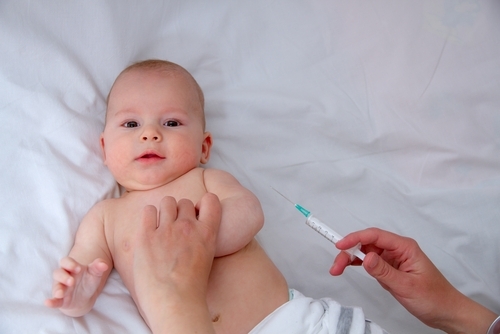The number of children getting measles vaccinations in the UK is the second lowest in Europe, according to new figures.
Data published by Unicef shows the global uptake for measles vaccines in 2018, in which the UK has lagged behind the rest of Europe.
Over 20% of unvaccinated children in Europe live in the UK, according to Unicef.
It follows claims from Public Health England that the lack of appointment availability is to blame for large numbers of missed vaccinations.
The measles vaccine is given in two doses and requires 95% coverage in order to protect against outbreaks, according to Unicef.
The national uptake for the first dose of the vaccine, MCV1, decreased from 93% in 2013 to 92% in 2016 and has stagnated up to 2018.
The number of children who did not receive the vaccine in 2018 was 62,000, up 6,000 (1%) from 2013. This represents 21% of the total unvaccinated children in Europe, second only to France who have 25% (73,000). The next highest is Italy with 11% (32,000) of unvaccinated children.
Uptake for the second dose of measles vaccine, MCV2, had previously increased but has now stalled. It rose from 88% in 2013 to 89% in 2014. But this figure dropped to 88% in 2017 and 2018.
In comparison, France’s MCV2 coverage has steadily increased over the past five years, from 75% in 2013 to 80% in 2018.
The number of children not getting the MCV2 vaccine in the UK is again the second highest in Western Europe at 97,000, after France at 149,000.
In Western Europe as a whole, the number of unvaccinated children, MCV1, has decreased from 295,000 in 2013 to 288,000 in 2018. And for MCV2, it dropped from 756,000 in 2013 to 616,000 in 2018.
However, Unicef estimated that the number of cases of measles around the world more than doubled between 2017 and 2018.
The research found disparities in measles vaccination across countries of all income levels, not just the developing world, and even those countries where overall vaccination rates are high.
Alastair Harper, director of advocacy at Unicef UK, said: ‘While availability, cost and access to vaccinations remains the biggest global obstacle, in high-income countries like the UK, the proliferation of vaccine-related misinformation on digital and social platforms is one of the key factors associated with vaccine hesitancy. Anti-vaccination groups are exploiting parents, creating confusion and stoking their fears in order to disrupt regular childhood vaccination schedules.
‘No child should die a preventable death, and every child has the right to lifesaving vaccinations. It is the responsibility of Government and health professionals to educate the public about the urgent need for vaccinations to protect not just their own children, but also the whole population – including babies under 6 months old, who are too young to be routinely given the MMR vaccine.’
Timing, availability and location of appointments have been identified as barriers to vaccination by parents are healthcare professionals.
Earlier this year, the BMA called the number of missed measles doses in the UK ‘incredibly concerning’.

















